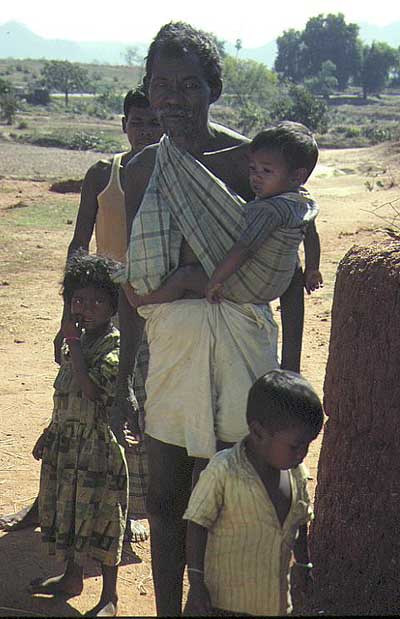 Postal address: SE-106 91 Stockholm, Sweden
Postal address: SE-106 91 Stockholm, Sweden
Visiting address: Universitetsvägen 10 B, Frescati
Web page: http://www.socant.su.se
Contact person: Professor Bengt G. (Beppe) Karlsson, phone: +46 (8) 16 15 62. Personal web page.
South Asia related researchers in the department:
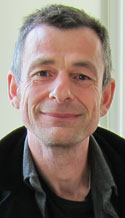
Professor Bengt G. (Beppe) Karlsson, works at the department since January 2010 (previously at the Dept. of Cultural Anthropology and Ethnology, Uppsala University).
After obtaining his PhD at Lund University he was teaching Anthropology at Linköping University and Uppsala University. In 2006 he was titled Associate Professor at Uppsala University and in January 2010 he took up the position as Senior Lecturer of Social Anthropology at Stockholm University. In 2014 Karlsson was promoted to full professor at Stockholm University.
Karlsson has also been guest researcher at the North-Bengal University, the University College London, the University of Chicago and the North-East Hill University.
During 2008-2009 he worked as an affiliated teacher at the Center for Social Sciences at Tbilisi State University in Georgia. He has also held a position as Director of the Nordic Centre in India (NCI), promoting student and research exchange between the Nordic countries and India. Karlsson was Head of Department between 2011 and 2014 and elected member of the Social Science Faculty Board at Stockholm University. He was also a committee member of the Swedish Research Council.
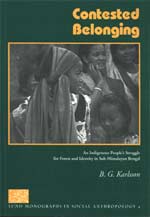 Beppe Karlsson defended his doctoral dissertation on ”Contested Belonging: An Indigenous People’s Struggle for Forest and Identity in Sub-Himalayan Bengal” at the Dept. of Social Anthropology, Lund University, in 1997. The thesis dealt with the modern predicament of the Rabha’ or Kocha’ people, their survival in the forest and their quest for identity. The Rabhas are one of India’s indigenous or tribal people, traditionally practising shifting cultivation in the jungle tracts situated where the Himalayan mountains meet the plains of Bengal.
Beppe Karlsson defended his doctoral dissertation on ”Contested Belonging: An Indigenous People’s Struggle for Forest and Identity in Sub-Himalayan Bengal” at the Dept. of Social Anthropology, Lund University, in 1997. The thesis dealt with the modern predicament of the Rabha’ or Kocha’ people, their survival in the forest and their quest for identity. The Rabhas are one of India’s indigenous or tribal people, traditionally practising shifting cultivation in the jungle tracts situated where the Himalayan mountains meet the plains of Bengal.
One of the central points of the book relates to the question of identity – the construction of identity as a form of resistance. Beppe Karlsson discussed the Reba’s ongoing conversion to Christianity and their ethnic mobilisation. The main theoretical issue of the book concerned the agency involved in the making of cultural or ethnic identities. Read the full thesis on Google Books (as a pdf-file).
His main research interests relate to questions of ethnicity and environment in India, with particular focus on indigenous peoples issues. At Uppsala University, he worked closely with the researcher Dr. Gunnel Cederlöf. From 2001, they were involved in a joint research project entitled ”Claims and Rights: Power and Negotiations over Nature in India: An Anthropological and Historical Study”. A project related to the emerging multi-disciplinary field studying Nature–Society relations and drawing particularly on recent debates within environmental history and political ecology. The main aim of the project has been to investigate the interplay between the state and indigenous communities in India in relation to claims and rights in forest land and natural resources. It had three sub-projects, two by Gunnel Cederlöf, and one by Beppe Karlsson – see below. More information about the main research project.
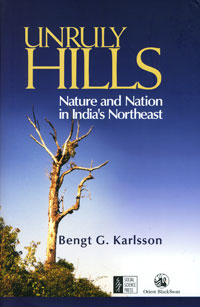 Beppe Karlsson’s sub-project was entitled ”Indigeneity and Nature: A Political Ecology of Meghalaya, Northeast India”, dealing with the politics of indigenousness and nature in India. More particularly, it related to the struggle over forests and natural resources in Meghalaya, a small hill state of about two million people situated in the north-eastern region, where the majority of the population (about 85 %) are indigenous peoples or so-called ”scheduled tribes”; the main ones being the Khasi, Jaintia and Garo people. The focus of the project was to investigate discourses or regimes of nature and how a number of actors perceive, engage with and claim nature.
Beppe Karlsson’s sub-project was entitled ”Indigeneity and Nature: A Political Ecology of Meghalaya, Northeast India”, dealing with the politics of indigenousness and nature in India. More particularly, it related to the struggle over forests and natural resources in Meghalaya, a small hill state of about two million people situated in the north-eastern region, where the majority of the population (about 85 %) are indigenous peoples or so-called ”scheduled tribes”; the main ones being the Khasi, Jaintia and Garo people. The focus of the project was to investigate discourses or regimes of nature and how a number of actors perceive, engage with and claim nature.
More information about the project.
At the International Conference on the Forest and Environmental History of the British Empire and Commonwealth held at the Centre for World Environmental History, University of Sussex, UK in March 2003 Beppe Karlsson presented a paper on ”Deforestation and conflicts over forests in Meghalaya”.
In 2005 Beppe Karlsson edited a volume called ”Indigeneity in India” together with Tanka B. Subba, Professor of Social Anthropology, North-Eastern Hill University, Shillong.
A monograph entitled ”Unruly Hills: Nature and Nation in India’s Northeast” is published in May 2011. This book summarises the 10 year old research project.
On 4 May 2011, Dr. Karlsson participated in the Lund University seminar on ”Forest Rights in India” that was jointly organised by SASNET, Lund University Centre for Sustainability Studies (LUCSUS), and The Swallows India Bangladesh. More information.
In the period between 2006 and 2008, Beppe Karlsson was enged in a research project on ”Environment and Violence: Water-conflicts, indigenous livelihoods, insurgency and the state in Northeast India”. The overall aim of the project was to understand the social and political dynamics relating to large-scale transformations of the environment. In short it aimed to develop a critical political ecology of water and, in particular, of the appropriation of nature for the purpose of hydro-power generation. In this, the various forms of violence intrinsic to and spawn by such appropriation (displacement, environmental protests, etc) will be given special attention. Geographically the project focuses on the waterscapes of Northeast India. The project is financed by the Swedish International Development Cooperation Agency Sida.
More information on Beppe’s research at Uppsala University.
 In October 2012, Professor Bengt G Karlsson received SEK 2.7 m as a grant from Riksbankens Jubileumsfond (RJ) for a three years (2013-15) project entitled ”The Indian Underbelly: Marginalisation and Migration in the Periphery”. It will focus on migrants from Northeastern India now living and working in the metropolitan cities of south India. More information.
In October 2012, Professor Bengt G Karlsson received SEK 2.7 m as a grant from Riksbankens Jubileumsfond (RJ) for a three years (2013-15) project entitled ”The Indian Underbelly: Marginalisation and Migration in the Periphery”. It will focus on migrants from Northeastern India now living and working in the metropolitan cities of south India. More information.
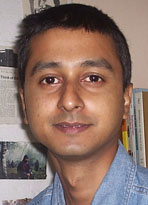 Bengt G Karlsson’s Indian research partner is Associate Professor Sanjay Barbora (photo to the left) at Tata Institute of Social Sciences (TISS), based at the TISS Northeast India campus in Guwahati. Dr. Barbora is also an Advisor for Media and Conflict at Panos South Asia. A sociologist by training, he has been associated for a long time with media and research initiatives in South Asia. He has edited a book on land alienation among indigenous peoples in Northeast India and has authored several academic articles on conflict, human rights and peace processes in South Asia. He has also been a regular contributor and political commentator for renowned dailies, magazines and journals. He is also the co-producer and director of a documentary film on migration and political change in Central Asia.
Bengt G Karlsson’s Indian research partner is Associate Professor Sanjay Barbora (photo to the left) at Tata Institute of Social Sciences (TISS), based at the TISS Northeast India campus in Guwahati. Dr. Barbora is also an Advisor for Media and Conflict at Panos South Asia. A sociologist by training, he has been associated for a long time with media and research initiatives in South Asia. He has edited a book on land alienation among indigenous peoples in Northeast India and has authored several academic articles on conflict, human rights and peace processes in South Asia. He has also been a regular contributor and political commentator for renowned dailies, magazines and journals. He is also the co-producer and director of a documentary film on migration and political change in Central Asia.
Project abstract: This project focuses on emerging forms of poverty and related process of marginalisation and migration in India. In particular, it wishes to understand the problems and prospects associated with the expansion of developmental activities and state-control, in areas that were traditionally associated with economic backwardness, social ferment and protracted political conflict. Since the past two decades, India’s economic growth has overshadowed the discordant realities of armed conflicts, be they against Maoists in central and eastern India, or ethnic autonomistsand separatists in Kashmir and the Northeast. Two clusters of villages in Assam and Manipur will be selected for in-depth investigations of changes in livelihoods, migration patterns and social organisation. Within the villages, we will trace movements from agriculture-based livelihoods to off farm activities, from rural to peri-urban/urban and further migration routes outside the region. The two states of Assam and Manipur have diverse populations, based in both valley and hills and have experienced political turmoil and demographic shifts in the past three decades.
The project is carried out in collaboration with a larger British research group led by Dr. Alpa Shah, Senior Lecturer at the Department of Anthropology, Goldsmiths, University of London. (Her group has received funding from the Europan Commission).
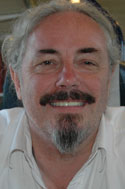 • Dr. Christer Norström defended his doctoral dissertation on “They Call for Us. Strategies for securing autonomy among the Paliyans, hunter-gatherers of the Palni Hills, South India”, on Friday 19 September 2003. Faculty opponent was Professor Alan Barnard, School of Social and Political Studies (Social Anthropology), University of Edinburgh, Scotland, UK.
• Dr. Christer Norström defended his doctoral dissertation on “They Call for Us. Strategies for securing autonomy among the Paliyans, hunter-gatherers of the Palni Hills, South India”, on Friday 19 September 2003. Faculty opponent was Professor Alan Barnard, School of Social and Political Studies (Social Anthropology), University of Edinburgh, Scotland, UK.
The dissertation deals with the Palni Hills of South India, where the Paliyans for decades have combined hunting and gathering with work within a plantation economy, it seems that the economic relations between them and their landholding Tamil neighbours is based on negotiation rather than subordination. These findings challenge earlier views, grounded on an ecological framework, which states the incompatibility between contemporary hunting and gathering societies and an expanding modern market economy. With a focus on the Paliyans’ arguments and strategies Norström demonstrated how their social system and basic values allow them to incorporate outside forces into their own “mode of subsistence”. The study also incorporates the role of the local government and NGOs. Fieldwork was conducted during several periods during 1991-2001, totally 25 months. Read the abstract (as a pdf-file).
Christer Norström is now teaching full-time at the department, and besides he is working on a book dealing with the modern history of the Palni Hills, the area he has studied for many years. It was supposed to be published during 2005.
In January 2003 Norström received SEK 108 000 as a SASNET planning grant for a programme on ”Livelihood strategies among forest-related tribal groups of South India.” The programme also involved the department’s Charles Camâra(see below), as well as Gunnel Cederlöf and Beppe Karlsson from the Dept. of Cultural Anthropology, Uppsala University.
The programme aimed at establishing a multidisciplinary research network between Nordic and South Asian scholars. The planning grant was used to arrange a conference on the issue at the Centre for Indian Studies, Mysore, India, 17–19 October 2003. The conference was organized in collaboration with the Centre for Research on Environment, Development, Innovations, Technology & Trade, CREDITTe, Bangalore.
Go to the conference page, where the papers presented are available for download.
Since 2007, Christer Norström has been involved in two India related research projects. First, a project on ”Food as a metaphor for the past and the future among farmers in South India: the perception of food and food production in a fast changing world”. This project was funded by the Swedish International Development Agency with a grant of SEK 2.11 M
Abstract: This project deals with the way food, food consumption and food production is perceived among farmers and other actors in South India. By using this focus the idea is to illuminate broader processes of a political-economic nature, including ideas and strategies for creating food security in a world which goes through a process of global agro-food restructuring. The perspective is global but the focus is on the local and regional articulation of globalisation. This approach is built on the assumption that the restructuring of production and relationships caused by globalisation, commoditisation and new farming techniques constrain life chances and options. However, people are not dealing with these changes as ‘passive victims’, but use their own capabilities and other resources, guided by their own perspectives on food, food consumption and food production, to try to create food security.
The second project was entitled ”An anthropologist among environmentalists: modern environmentalism through the eyes of three India-based activists”. This project was based on the life histories of three individuals, based in South India, who have devoted their entire lives to environmental issues. With this focus two interrelated aspects will be emphasised. On the one hand these life histories will bring in a historical dimension on transnational processes of environmental issues over the last decades, especially from a local point of view, and on the other hand, the focus on individuals will give personal experiences of environmental issues otherwise usually framed in institutional and/or structural terms.
The latter implies a more general theoretical orientation within anthropology that gives emphasis to the place of the individual in anthropological theorising and ethnographic writing, and the way individuals consciously and creatively engages with their socio-cultural milieu. Fieldwork and the information for this book have been generated since 1988 until today through my close interaction and co-operation with Indian environmentalists.
More information about Christer’s research on his personal web page.
Christer Norström is now engaged in a research project on ”Whose Agenda?: A Local Environmental NGO in the Middle of a Turmoil of Perspectives”, doing fieldwork in Tamil Nadu, India. He presented the project in a panel on ”Causes and solutions to conflicts on natural resources” at the Sida-funded conference on current Swedish development research titled ”Meeting Global Challenges in Research Cooperation” that was jointly organised by Uppsala Uppsala University and the Swedish University of Agricultural Sciences (SLU) in Uppsala 27-29 May 2008.
Abstract to project: Many farmers in South India have found themselves in deep economic trouble during the last decades due to their dependency on land, and especially so in the dry-land areas where heavy land degradation in combination with deficit rainfall have forced them to a significant change in their agriculture. Today these problems have evoked a lot of attention and many different actors are trying to deal with these issues. The research is based on ongoing anthropological fieldwork concerning food security and changing consumption patterns among farmers in Tamil Nadu, and aims to discuss a local environmental NGO (themselves farmers) and its interaction with other partners, including farmers, regional and international NGOs as well as government agencies. Although all actors involved have the same general idea of turning a negative trend of agriculture into a positive one, Norström intends to demonstrate that the agendas of the different actors involved do not always go in tandem. This fact put severe pressure and a demand of a high degree of negotiation skill on the local NGO to be able to mediate and use these inputs to achieve their goal of a sustainable agriculture for the future.
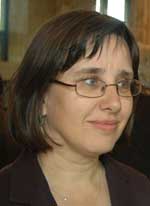 • Dr. Marie Larsson defended her doctoral dissertation about mobilisation among women against men’s alcohol consumption in Andhra Pradesh on Friday 9 June 2006. The thesis is titled ”When Women Unite!. The Making of the Anti-Liquor Movement in Andhra Pradesh, India”. The Faculty opponent was Prof. Shalini Randeria, Ethnologisches Seminar, Universität Zurich, Switzerland.
• Dr. Marie Larsson defended her doctoral dissertation about mobilisation among women against men’s alcohol consumption in Andhra Pradesh on Friday 9 June 2006. The thesis is titled ”When Women Unite!. The Making of the Anti-Liquor Movement in Andhra Pradesh, India”. The Faculty opponent was Prof. Shalini Randeria, Ethnologisches Seminar, Universität Zurich, Switzerland.
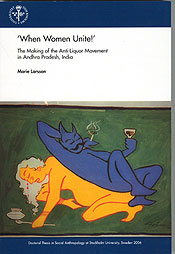 Abstract: In the early nineties an anti-arrack campaign started among poor village women in Andhra Pradesh in Southern India, primarily among Scheduled Castes (formerly Untouchables) and Muslims. The movement subsequently spread throughout the state. Its origin is usually taken to be the event when, in 1991, women from Dubagunta, Nellore District, drove the liquor contractors out of their village. The so-called anti-arrack movement finally led to that alcohol was prohibited in Andhra Pradesh on the 16 of January 1995. The main participants were disprivileged women from Muslim groups or so-called “Scheduled Castes “, supported by voluntary organisations and later on by politicians from the opposition parties.
Abstract: In the early nineties an anti-arrack campaign started among poor village women in Andhra Pradesh in Southern India, primarily among Scheduled Castes (formerly Untouchables) and Muslims. The movement subsequently spread throughout the state. Its origin is usually taken to be the event when, in 1991, women from Dubagunta, Nellore District, drove the liquor contractors out of their village. The so-called anti-arrack movement finally led to that alcohol was prohibited in Andhra Pradesh on the 16 of January 1995. The main participants were disprivileged women from Muslim groups or so-called “Scheduled Castes “, supported by voluntary organisations and later on by politicians from the opposition parties.
The local state administration, the literacy campaign and the newspaper Eenadu have also been described as important for the expansion of the movement. The present study is an attempt to use this case in order to understand how people can be mobilised from concerns with problems in their own everyday life to join a translocal, maybe transnational movement, with a certain political agenda. What effect does participation have on women´s private situation? What does the social mechanism for mobilisation look like? How does the translation from the private to the general occur?
At the other end, where do movement leaders get their ideas from? What makes a special question in the international supply of issues relevant for regional intellectuals? Why are they interested to mobilise the poor? Which audience do they have? What methods do they use? What is the relation between the participants of the movement and political leaders and the state administration? These are topics that I will address in my study. I will also relate the women’s temperance movement in India to wider issues of feminist mobilisation as well as to class and caste emancipation. Attitudes towards alcohol will obviously be a part of the analysis.
On October 22, 2009, Dr. Marie Larsson was awarded SEK 1.985 M as a three-year grant (2010-12) by the Bank of Sweden Tercentenary Foundation (Stiftelsen Riksbankens jubileumsfond), for a new research project entitled ”The Invisible labourers! Transnational and local activism among home-based women workers in Manila, Leeds and Ahmedabad”. The project was launched on 1 September 2010. In India, an informal collaboration has been established with the Gujarat
Institute of Development Research (GIDR) in Ahmedabad.
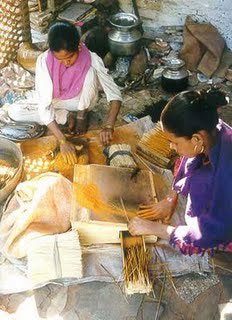 Abstract: This project deals with transnational mobilization among home-based workers. Its participants consist of persons, mostly women, who carry out low-paid remunerative work at (or near) their homes as industrial homeworkers or as self-employed. Their tasks have often not been considered as work, which have contributed to their low salaries and uncertain labour conditions.
Abstract: This project deals with transnational mobilization among home-based workers. Its participants consist of persons, mostly women, who carry out low-paid remunerative work at (or near) their homes as industrial homeworkers or as self-employed. Their tasks have often not been considered as work, which have contributed to their low salaries and uncertain labour conditions.
The aim of this study is to explore transnational and localized activism among home-based workers from the perspective of three groups: PATAMABA in Manila, the Philippines; Homeworkers Worldwide (HWW) in Leeds, England; and SEWA (Self-Employed Women’s Association) in Ahmedabad, India (photo of SEWA workers to the right). Which networking practices have taken place? What is the role of the three organizations in the translation of ideas on the rights of home-based workers from one locality to another?
The study is based on fieldwork in Manila, Leeds and Ahmedabad. Dr. Larsson aims is to trace the networks and explore the ongoing debates by following activists in their daily life. The project points to the interconnection between the global division of labour and how women’s work is valued locally. On the other hand, the study discusses emergent forms of global activism through transnational advocacy networks, social movements and Non-Governmental organizations (NGOs).
More information about Marie’s research on her personal web page.
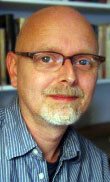 • Since 2004, PhD candidate Per Drougge is working on a dissertation project with the preliminary title “Movable Monasticism: Buddhist Modernism and the Monastic Ideal”, an ethnographic exploration of Buddhist monasticism in relation to the assemblage of religious idea(l)s and practices commonly referred to as “Buddhist modernism”. This multi-sited study is based on fieldwork in Japan, India, The United States, and Europe.
• Since 2004, PhD candidate Per Drougge is working on a dissertation project with the preliminary title “Movable Monasticism: Buddhist Modernism and the Monastic Ideal”, an ethnographic exploration of Buddhist monasticism in relation to the assemblage of religious idea(l)s and practices commonly referred to as “Buddhist modernism”. This multi-sited study is based on fieldwork in Japan, India, The United States, and Europe.
Drougge also has a strong interest in medical and psychological anthropology, especially the area where soteriological and therapeutic practices and experiences overlap. In this context he has done research on the relation between secularized mindfulness-based therapies and theravāda Buddhist meditation, and on Naikan, a very different form of “Buddhist psychotherapy”, and the way it is interpreted and practiced in Japan and Europe. More information.
From January 2009 till September 2010, Mr. Drougge was a deputy member of SASNET’s board, as a representative for doctoral candidates. More information about the board.
SARI – Stockholm Anthropological Research on India
For many years, Eva-Maria Hardtmann, and Christer Norström were in charge of SARI – a group of researchers within the Dept. of Social Anthropology at Stockholm University forming one of the major South Asian studies environments at Swedish universities. The research focused on cultural values and changing identities in contemporary India. Several researchers in SARI carried out their fieldwork in India, approaching their areas of research from a relatively new angle. These projects have been informed by a perspective on contemporary India as a part of the global scene and by a focus on processes of cultural communication. Both the geographic locations and the people studied in these projects are approached within a framework of translocal and transnational interconnections.
The projects undertaken constitute a potential link between traditional small-scale ethnographical studies and macro-oriented studies of overarching political and economic transformations. Several projects emphasized the process of identity formation in contemporary India as well as the construction (reconstruction) of images of Indian society and their distribution in different contexts (in social movements and NGOs, among journalists, tourist guides etc). SARI worked on themes and from 2007/2008 the theme chosen was “Dalits in the Neoliberal Global Order”. (Both Eva-Maria Hardtmann and Christer Norström were for a few years in the mid 2000s members of the SASNET board)
Previous South Asia research at the department
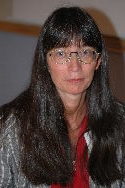 • Dr. Eva-Maria Hardtmann defended her doctoral dissertation on ”Our Fury is Burning – Local Practice and Global Connections in the Dalit Movement”, on Friday 7 November 2003. The thesis focuses on the cultural discourses as well as the organizational aspects within the contemporary Dalit movement in India. From 2014, Eva-Maria Hardtmann is working at the Dept. of Cultural Anthropology and Ethnology, Uppsala University. Here she is doing research on social movements, activism, transnationalism, gender, and power relations. Geographically her focuses are on South Asia, mainly India and Nepal, but she has also carried out field studies among activists in Japan, and during World Social Forums in Brazil and Kenya. Her current research project, ”Transnational networks within the Global Solidarity Movement: Four Social Movements originated from India, Japan, France, and Honduras” focuses on the daily work and everyday practices among activists to create and uphold transnational networks within the Global Justice Movement.
• Dr. Eva-Maria Hardtmann defended her doctoral dissertation on ”Our Fury is Burning – Local Practice and Global Connections in the Dalit Movement”, on Friday 7 November 2003. The thesis focuses on the cultural discourses as well as the organizational aspects within the contemporary Dalit movement in India. From 2014, Eva-Maria Hardtmann is working at the Dept. of Cultural Anthropology and Ethnology, Uppsala University. Here she is doing research on social movements, activism, transnationalism, gender, and power relations. Geographically her focuses are on South Asia, mainly India and Nepal, but she has also carried out field studies among activists in Japan, and during World Social Forums in Brazil and Kenya. Her current research project, ”Transnational networks within the Global Solidarity Movement: Four Social Movements originated from India, Japan, France, and Honduras” focuses on the daily work and everyday practices among activists to create and uphold transnational networks within the Global Justice Movement.
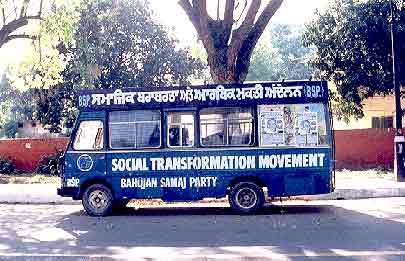 Faculty opponent at the 2003 dissertation was Professor Martin Fuchs, Freie Universität Berlin, Germany. The well-written thesis focuses on the cultural discourses as well as the organizational aspects within the contemporary Dalit movement, so as to examine processes related to identity formation.
Faculty opponent at the 2003 dissertation was Professor Martin Fuchs, Freie Universität Berlin, Germany. The well-written thesis focuses on the cultural discourses as well as the organizational aspects within the contemporary Dalit movement, so as to examine processes related to identity formation.
Abstract: Most Dalit activists, protesting against caste discrimination, are to be found in India, but the movement networks reach beyond the Indian state borders. The international and global involvement of the activists, as, for example, in the UN or more recently in the global justice movement, has increased during the last decade.
Activists among ‘scheduled castes’ (so-called untouchables) have, for the reason that they were excluded from the Indian public sphere, created and re-created their own counterpublic at least since the 1920s. They have their own arenas, publishing houses, magazines and networks to express their own cultural discourses. Since the beginning of the 1990s the Dalit discourses have reached the general public to a larger extent than before. The heterogeneity within the movement, with a multitude of groups and varied movement perspectives, will be displayed and mutually re-lated. It will also be shown how the Dalit activists have come to share a tacit knowl-edge regarding their common main conflict with ‘Hindus’ and ‘Hindu values’.
In November 2004 Eva-Maria Hardtmann received a three-years grant (June 2005–May 2008) from Sida/SAREC for a project on ”The Dalit Movement: Global Connections and the Return to Local Networks”. See the full list of recipients of Sida/SAREC grants 2004. The study is a continuation of an earlier project about identity formation in the Dalit movement.
Abstract for project: The transnational Dalit movement (a protest movement against the caste-system) has the last years become part of the global justice movement. Dalit activists now formulate their demands in terms of economic equality, democracy and human rights. The project takes the international and global contexts in which the Dalit activists interact and communicate as a point of departure. A central aim of the study is to understand the processes in which the experiences from these contexts are transmitted to local/regional NGOs in India and Nepal, where the activists are also active. Parts of the fieldwork have been carried out at international conferences in Hague and Genève during 2006 and at World Social Forum in Nairobi, Kenya in 2007.
In August 2007, Eva-Maria Hardtmann received SEK 62 000 as a SASNET Planning grant for interdisciplinary workshops, for a ”Conference on Dalits in the Global Justice Movement: Researchers and Activists in Dialogues”. See the full list of SASNET planning grants 2007.
The workshop was organised within the framework of the above-mentioned research project on ”Dalits in the Global Justice Movement”. It was held in Kathmandu, Nepal, 3–4 April 2008, and co-organised by the Dalit activist Vincent Manoharan.
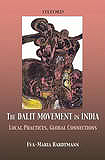 In 2009, Eva-Maria Hardtmann published her book ‘The Dalit Movement in India: Local Practices, Global Connections‘ (Oxford University Press, New Delhi). More information about the book.
In 2009, Eva-Maria Hardtmann published her book ‘The Dalit Movement in India: Local Practices, Global Connections‘ (Oxford University Press, New Delhi). More information about the book.
In October 2008, Dr. Hardtmann was awarded SEK 2.170 M as a three-year grant (2009-12) by the Bank of Sweden Tercentenary Foundation (Stiftelsen Riksbankens jubileumsfond), for a new research project entitled ”Transnationella nätverk inom globala rättviserörelsen: Fyra sociala rörelser med ursprung i Indien, Japan, Frankrike och Honduras” (Transnational networks within the Global Solidarity Movement: Four Social Movements originated from India, Japan, France, and Honduras).
Abstract (in Swedish only): Det årliga World Social Forum som erbjuder ett alternativ till World Economic Forum i Davos (Schweiz) har sedan starten 2001 lockat till sig aktivister, intellektuella, musiker, konstnärer och andra under parollen: ”En annan värld är möjlig!” Det ursprungliga intresset från media och allmänheten verkar dock ha mattats av något och under det senaste World Social Forum i Nairobi 2007 sjönk deltagarantalet för första gången. Detta betyder inte att aktivisterna i globala rättviserörelsen är inaktiva, utan snarast att formerna för deras aktiviteter har förändrats. Idag skapar aktivisterna nätverk på en mer regelbunden basis och World Social Forum processen pågår året runt. Dessa nätverk kommer med största sannolikhet att få en stor politisk betydelse under de närmsta decennierna och bör därför studeras ingående av forskare inom olika discipliner. Detta projekt kommer att studera aktivister i fyra olika transnationella sociala rörelser som alla är del av globala rättviserörelsen. Syftet är att bidra till förståelsen av processer, då aktivister i rörelser som involverar olika kategorier av människor med olika fokus, och med bas i olika delar av världen skapar nätverk mellan sina respektive rörelser. Genom att följa och dokumentera det dagliga arbetet bland aktivisterna kommer studien att bidra med ett etnografiskt exempel på det som brukar benämnas alternativ globalisering.
During the spring 2011, Eva-Maria was doing fieldwork among Dalit activists in Kathmandu, Nepal. She was working with Feminist Dalit Organization (FEDO), and Jagaran Media Centre, a media centre run by Dalit journalists. The ambition was to study and understand how the activists maintain trans-national contacts with activists in other parts of South Asia and the rest of the world
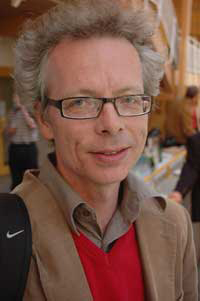 • Dr. Per Ståhlberg defended his doctoral dissertation on ”Lucknow Daily: How a Hindi Newspaper Constructs Society” on Friday 20 December 2002. Faculty opponent was Dr Thomas Blom Hansen, University of Edinburgh, Scotland.
• Dr. Per Ståhlberg defended his doctoral dissertation on ”Lucknow Daily: How a Hindi Newspaper Constructs Society” on Friday 20 December 2002. Faculty opponent was Dr Thomas Blom Hansen, University of Edinburgh, Scotland.
Since 1 March 2010, Per Ståhlberg works as Associate Professor at the Division of Media and Communication Studies, School of Culture and Communication, Södertörn University College in Huddinge, south of Stockholm. He is now (2013) Head of department.
Per actually started to teach part-time at Södertörn University College in Huddinge already in 2006. Another part-time he spent teaching in ”Omvärldskunskap” at the Swedish National Police Academy in Stockholm.
The dissertation project dealt with the regional Hindi-language press and its journalists in the North Indian state of Uttar Pradesh. The aim of the study was to ascertain the conditions under which media produces its image of reality in a developing country. Of particular interest is how journalists use collective categories when reporting about religious or social groups in society. Theoretically, the project links up with mass media research on news production, anthropological discussion of the distribution of knowledge in complex societies, as well as specific research on institutions in the modern Indian nation state.
In October 2006 Per Ståhlberg was given SEK 1.7 million as a grant from the Bank of Sweden Tercentenary Foundation(Stiftelsen Riksbankens jubileumsfond), for a research project about ”India as a Global Superpower; An Anthropological Study of Future Visions”.
Project abstract: India is nowadays viewed as a coming economic superpower. Economic liberalization and a good supply of low wage English-speaking labour have made the country competitive in the global market place. The high quality of technical education and successes for companies in the ICT business contribute to the image of a new “knowledge nation”. However, the Indian superpower is, despite certain impressive developments, very much a vision of the future. The image of success could be regarded as a social construction, created in the interaction between a numbers of actors with partly different motives. For example, the Indian Government and industry that are promoting a strong “Brand India”, international finance institutes aiming to interpret changes in world economy, and the mass media (Indian as well as international) creating comprehensible representation of a country. The aim of this project is, firstly, to examine the production of a new image of India and analyse its themes and variations, within the country as well as in an international context. Secondly, Per Ståhlberg will study what is happening on the ground, in a place that has a key position in the vision about a glorious Indian future: How are grand expectations interpreted among some categories of “brokers” that in a concrete manner deal with this vision? The first part of the study is based on media material and text documents. The second part is based on fieldwork in the South Indian city of Hyderabad.
Currently, Per Ståhlberg is working on a project similar to his dissertation project, now entitled ”Media, Occupational Culture and the Production of Imagined Communities. A Study of Indian Journalists”. This project is again concerned with the regional Hindi-language press and its journalists in the North Indian state of Uttar Pradesh.
Abstract: The aim of the study is to ascertain the conditions under which media produces its image of reality in a developing country. Of particular interest is how journalists use collective categories when reporting about religious or social groups in society. Theoretically, the project links up with mass media research on news production, anthropological discussion of the distribution of knowledge in complex societies, as well as specific research on institutions in the modern Indian nation state. The point of departure will be to focus on everyday practice of news production, and on the occupational culture of journalism and the journalist’s assessment of the news and objectivity. Field research will be carried out over a period of twelve months on newspapers in the city of Lucknow. The study will be conducted primarily through participant observation and informal interviews. To a limited extent printed news material will also be analysed.
More information on Per’s personal web page.
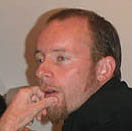 • Dr. Paolo Favero defended his doctoral dissertation on ”India dreams: Cultural identity among young middle-class men in New Delhi“, on Friday 25 February 2005. The project has been part of a major research project on ”Modernities in transition: A Study of Youth Cultures in Iran, Brazil and India”, financed by the Bank of Sweden Tercentenary Foundation (Stiftelsen Riksbankens jubileumsfond), and led by Professor Gudrun Dahl. Faculty opponent at the dissertation was Marcus Banks, Institute of Social and Cultural Anthropology, University of Oxford, UK.
• Dr. Paolo Favero defended his doctoral dissertation on ”India dreams: Cultural identity among young middle-class men in New Delhi“, on Friday 25 February 2005. The project has been part of a major research project on ”Modernities in transition: A Study of Youth Cultures in Iran, Brazil and India”, financed by the Bank of Sweden Tercentenary Foundation (Stiftelsen Riksbankens jubileumsfond), and led by Professor Gudrun Dahl. Faculty opponent at the dissertation was Marcus Banks, Institute of Social and Cultural Anthropology, University of Oxford, UK.
In addition to the doctoral dissertation a documentary film called ”Fly over Delhi” was produced by Paolo Favero and Angelo Fontana. The film was shown during the conference on ”Structures of Vulnerability: Mobilisation and Resistance” that the department organised 12–14 January 2005.
Project abstract: The project focuses on the dynamics of social mobility and cultural change among young middle-class men in contemporary urban India. With the opening of Indian economy to the global market in 1991 new life-worlds as well as new possibilities for social mobility have entered the country and influenced especially young people. A new era of increased interactions with the outer world started. This study focuses on the generation that epitomizes this new era and is based on fieldwork among young English-speaking, educated, Delhi-based men involved in occupations such as tourism, Internet, multinationals, journalism and sports.
These young men construct their role in society by promoting themselves as brokers in the ongoing exchanges between India and the outer world. Together they constitute a heterogeneous whole with different class- and regional background. Yet, they can all be seen as members of the ‘middle-class’ occupying a relatively privileged position in society. They consider the opening of India to the global market as the key-event that has made it possible for them to live an “interesting life” and to avoid becoming “average Indians”.
“India dreams” is an exploration into the life-world of these young men and moves between issues of cultural identity in their everyday life, their views and uses of Delhi, their ideas of India, its history and its relation to the West, their notions of young women and masculinity. The study focuses in particular on how these young men construct and experience their identities facing the messages and images that they are exposed to through their involvement with travelling flows of images and conceptualizations. It suggests that the ‘import’ of trans-national imagination into everyday life gives birth to sub-cultural formations, new “communities of imagination” that cross conventional Indian community boundaries. Their members share a similar imagination of themselves, of Delhi, their country and the world.
“India dreams” will primarily approach cultural identities through abstract categories with shifting reference (Favero refers to them as ‘phantasms’) such as ‘India’, ‘West’, ‘tradition’ and ‘modernity’. The young men in this study understand themselves and what surrounds them by invoking such terms, mirroring the debates on change that have gone on in India since colonization. Yet, they imaginatively re-work the content of these discourses and give the quoted terms new meanings. In their usage ‘being Indian’ is turned into a ‘global’, ‘modern’ and ‘cosmopolitan’ stance while ‘being Westernized’ can become a marker of ‘backwardness’ and lack of sophistication. Their experiences mark out the contemporary popularity of notions of Indianness in metropolitan India.
In November 2005 Dr. Favero received SEK 648 000 as a three-years grant (2006-08) for a post-doc project titled ”‘FILMI STYLE’ AND THE AESTHETICS OF EVERYDAY LIFE, a visual study of visual culture in Indian diaspora in Rome” from the Swedish Research Council. More information about the project (only in Swedish).
Dr. Paolo Favero is now working at Centro de Estudos de Antropologia Social (CEAS), Instituto Superior de Ciências do Trabalho e da Empresa (ISCTE), University of Lisbon, Portugal.
• Dr. Björn Alm defended his doctoral dissertation at the department on ”The un/selfish leader. Changing notions in a Tamil Nadu village” on Friday 5 May 2006. The study is based on fieldwork carried out in Ekkaraiyur between 1988 and 1990. Faculty opponent was Dr. Jens Lerche, School of Oriental and African Studies, London University, UK. Read the abstract (with a link to the full-text dissertation).
Björn Alm is now working at the Division for Social Anthropology, Department of Religion and Culture (IRK), Linköping University.
• PhD Candidate Charles Camâra worked on a project on ”The Siddis – Emancipatory Struggles among the Contemporary Afro-Indians”. The Siddis are a heterogenous collection present-day descendants of African slaves, merchants and soldiers who arrived in India centuries ago. This study is about their situation at the end of the 20th century, often characterized by a social stigma and by material poverty. It deals with Siddi grassroots activism directed at changing and improving their situation, but also with how their ethno-genesis as a self-conscious ethnic category has been both locally engendered and further shaped by global influences. The study concentrates on those Afro-Indians who live in the former Portuguese colonies and their hinterlands, but the issue has wider ramifications as pan- Indian connections are sought by the activists.
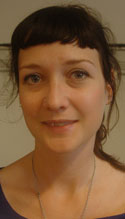 MSc Johanna Sommansson is anthropologist rooted in the field of South-East Asian studies and Indology. After graduating as a Master of Anhtropology from Stockholm University, Johanna has been working on a visual anthropology project called ”Desi Girls!”, about middle class college girls in Delhi and how they view expressions of gender in their daily lives. ”Desi Girls!” premiered in May 2010 and she later prepared for a follow-up project with the same college girls who figured in the mini documentary.
MSc Johanna Sommansson is anthropologist rooted in the field of South-East Asian studies and Indology. After graduating as a Master of Anhtropology from Stockholm University, Johanna has been working on a visual anthropology project called ”Desi Girls!”, about middle class college girls in Delhi and how they view expressions of gender in their daily lives. ”Desi Girls!” premiered in May 2010 and she later prepared for a follow-up project with the same college girls who figured in the mini documentary.
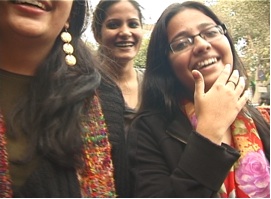 During 2011 and 2012 Johanna will be in India working on a cross-urban project since the Delhi college girls now are located at different Indian universites.
During 2011 and 2012 Johanna will be in India working on a cross-urban project since the Delhi college girls now are located at different Indian universites.
Johanna Sommansson participated in SASNET’s conference on South Asian Studies for young Nordic scholars that was held in Höllviken, south of Malmö, on 18–20 August 2010, and her film was shown as part of the programme. 23 masters students, PhD candidates and recent PhDs from Sweden, Denmark, Norway and Finland participated in the three-day conference focusing on three major issues: Interdisciplinary Research; Field Work and Ethics; and Academic Career (Publishing, Teaching, Networking). More information.
 Johanna Sommansson is the Editor of the web based SYDASIEN magazine (the paper version was closed down in 2011). The online journal Sydasien.se is the only swedish journal featuring South Asia related articles focusing on cultural issues and political debates. You will also find various articles on recent news and events, in-depth research accounts, stories from NGO-organizations work in the region, Human Rights issues, Womens & Childrens Rights issues, Enviromental issues and Poverty issues.
Johanna Sommansson is the Editor of the web based SYDASIEN magazine (the paper version was closed down in 2011). The online journal Sydasien.se is the only swedish journal featuring South Asia related articles focusing on cultural issues and political debates. You will also find various articles on recent news and events, in-depth research accounts, stories from NGO-organizations work in the region, Human Rights issues, Womens & Childrens Rights issues, Enviromental issues and Poverty issues.
You may also join Sydasien.se via Facebook: www.facebook.com/sydasien
For 34 years the Swedish-language print magazine SYDASIEN played an important role to disseminate news and information on South Asia. With popularly written articles on politics, history, literature and culture in the eight countries that consist South Asia (Afghanistan, Bangladesh, Bhutan, India, Maldives, Nepal, Pakistan and Sri Lanka) SYDASIEN was a unique feature in Scandinavia till the magazine closed down in late 2010.
Lars Eklund, now SASNET deputy director, was the editor in chief for 25 years, during the period 1982–2007. Go for the 2007 web page, with an index back in time.
Research conference on ”Structures of Vulnerability: Mobilisation and Resistance”
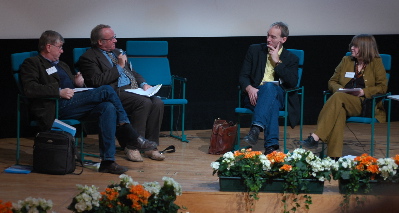 In collaboration with the Swedish International Development Cooperation Agency Sida, the Dept. of Social Anthropology organised a conference focusing on ”Structures of Vulnerability: Mobilisation and Resistance”, 12–14 January 2005.
In collaboration with the Swedish International Development Cooperation Agency Sida, the Dept. of Social Anthropology organised a conference focusing on ”Structures of Vulnerability: Mobilisation and Resistance”, 12–14 January 2005.
It was the largest gathering so far in Sweden of Third world oriented researchers, within fields such as Biodiversity, Children and youth, Climate, Corruption, Environment, Ethnicity, Food and water, Gender, Hazards, Health, Infrastructure, Law, Religion, Urbanity, War and violence, and Welfare. More than 300 researchers and graduate/post graduate students took part in the higly succesful conference, and a vast number of South Asia related research papers were presented in the workshops.
Key note speakers were Professor Ben Wisner, lecturing on ”Root causes of vulnerability: What do we know after 30 years and what is to be done about them”, Professor Hunter Wade and Professor Johanne Sundby. A panel debate was also held on ”Victims and Actors – who get the blame? Concepts of structure and agency in the development research”, with Ass. Prof. Hans Abrahamsson and Prof. Björn Hettne from PADRIGU, Göteborg University, Prof. Thomas Hylland Erikssen, Oslo University, and Prof. Gudrun Dahl, Dept. of Social Anthropology, Stockholm University (photo above).
It was the third conference in a series of conferences financed by Sida, on the challenges faced by the research community in developing countries. The first conference was arranged with Göteborg University in January 2000, and the second, named ”Poor and Rich” was held at Lund University in January 2003 (more information on the Lund conference).